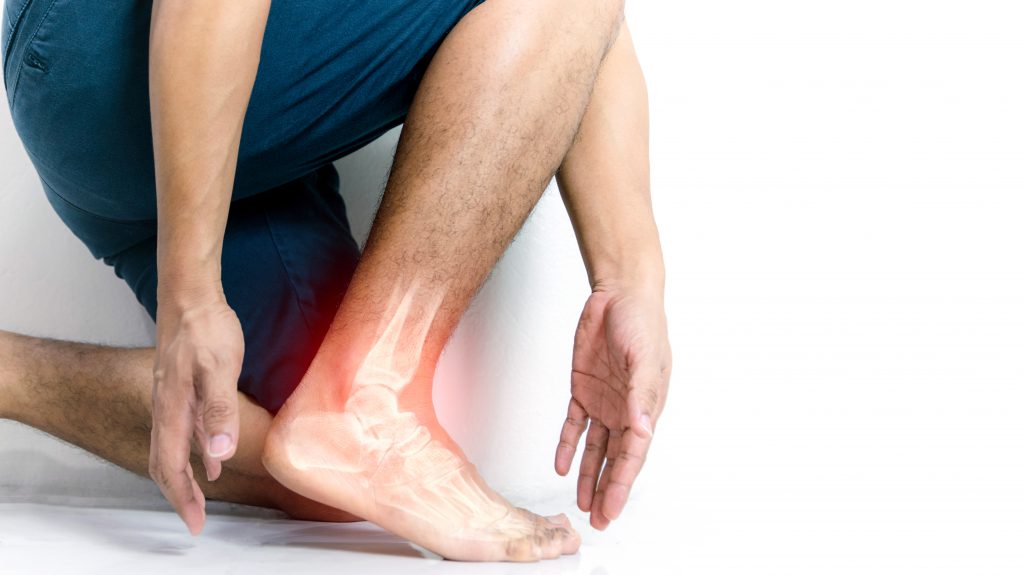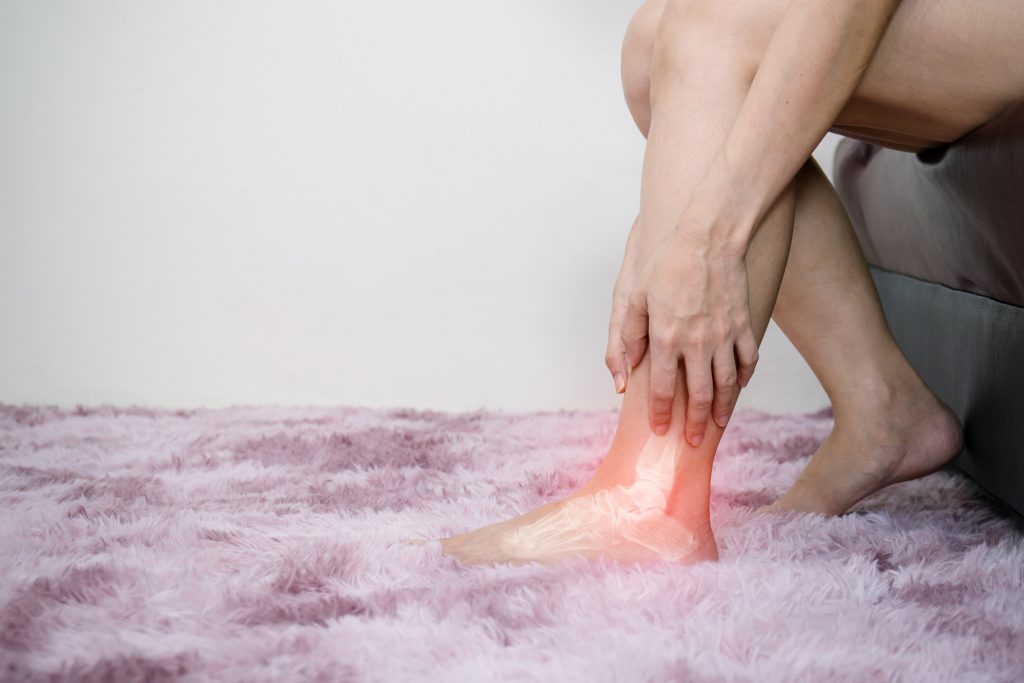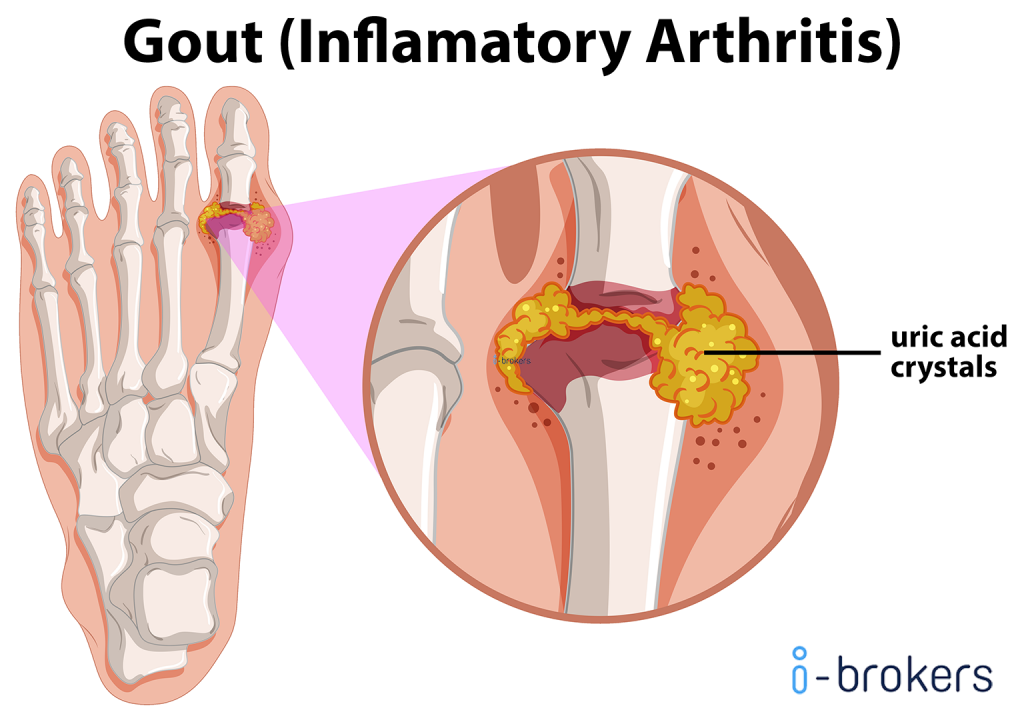Gout typically impacts the joint in the big toe. However, gout on ankle is also common. Although gout tends to impact men more than women, it is likely to affect women following their menopause.
Flare-ups of gout on ankle can happen all of a sudden and can take place again as time goes by.
Here we have put together a guide on how to prevent gout on your ankle. In addition, we supply answers to frequently asked questions (FAQs) about gout.
Table of contents

Gout on Ankle Symptoms
Understanding the symptoms of gout attacks on the ankle is crucial, as they are often unpredictable. You may experience no symptoms for weeks or months, and then suddenly, there’s pain in your ankle. Gout typically begins in the big toe and can progress to other areas, including the ankle. Recognizing the Symptoms of gout on the ankle is essential for early intervention. Gout on the ankle manifests through:
- Redness and Swelling: The affected area becomes red and swollen, often accompanied by a sensation of heat.
- Stiffness and Tenderness: The ankle may feel stiff and extremely tender to the touch.
- Sudden Onset of Pain: Gout attacks often occur suddenly, typically at night, causing intense pain.
Gout sometimes begins in one of your big toes. Then it goes on to other regions such as your ankle. When you have gout on your ankle, you might have the following symptoms: redness, stiffness, swelling, tenderness and warmth to the touch.
How to prevent gout on ankle
To prevent the symptoms above from happening to you, here are 6 tips you can follow in order to reduce your chances of getting gout on ankle.
1. Forbidden Foods and Must-eat Foods
To help prevent flare-ups of gout on ankle, these are the foods you must eat and forbid.
Forbidden Foods
Certain foods can trigger gout attacks due to high purine content. These include:
- High-Purine Meats: Avoid meats like liver and game meats (e.g., rabbit, duck, deer).
- Seafood: Shellfish and certain fish like anchovies and herring should be limited.
- Sugary Foods: Reduce intake of sugary snacks and beverages.
Must-Eat Foods
Incorporate these into your diet to help prevent gout:
- Low-Fat Dairy: Options like skim milk and yogurt are beneficial.
- Cherries: Studies suggest cherries can reduce gout flare-ups.
- Healthy Carbohydrates: Focus on fruits, vegetables, whole grains, and beans.
According toPubMed, you are recommended to eat low fat dairy such as skim milk and yogurt as well as cherries. Apart from these two types of food, you should eat fruits, vegetables, complex carbohydrates, whole grains and beans.
2. Banned medications
Keep in mind that you need to avoid medicine that is likely to cause gout on ankle. Those medications include diuretics. If you are taking diuretics that are related to hyperuricemia, you need to request your doctor to change the medication at once.
Avoiding Harmful Medications
Be cautious of medications that can exacerbate gout, such as certain diuretics. Consult your doctor for alternatives.
Prescribed Gout Medication
Medications like allopurinol and febuxostat can help manage uric acid levels. Always follow your doctor’s prescription.
3. Intake of gout prescribed medication
If you have an excess of uric acid in the body, you need to take prescribed medicine such as allopurinol and febuxostat or their alternatives to lessen the amount of uric acid.
4. No alcohol consumption
Avoiding consuming alcohol altogether is best when it comes to minimizing the potential of developing gout. Only one or two glasses of alcoholic drink can boost your chances of a gout flare-up. The number of alcoholic drinks consumed is directly proportional to the risk level.
5. Large intake of water
Drinking more water will lead to healthier kidneys which in turn help your body get rid of uric acid from the body. This subsequently diminishes your probability of getting gout.
6. Weight control
Controlling your weight by physical exercise plays an important role in decreasing the risk of gout. In accordance with PubMed, massive weight loss that occurs from bariatric surgery tends to raise the risk of gout in the short run. However, natural weight loss whether it is abrupt or slow is the key to reducing the chances of gout flare-ups in the long run.

Get a Quote here.
Why wait? Join 82% of savvy expats who save big by comparing Medical Insurance Premiums with i-Brokers.
Understanding Gout Pathophysiology
It also illustrates the divergence between unmanaged and managed gout, highlighting the importance of treatment and lifestyle changes in reducing symptoms.

FAQs about Gout
Can gout be cured?
Currently, there is no cure for gout. But you can treat it with medication coupled with changes in your lifestyle.
Can gout cause a fever?
According to PubMed, gout on ankle does not directly cause a fever. However, it tends to happen when a gout flare-up impacts two or more joints or ankles. The inflammation that takes place when you have a gout attack can sometimes lead to fever or flu-like symptoms.
Is gout hereditary?
No. Gout on ankle is not hereditary. As a matter of fact, if you get gout-related genes from your parents, they do not directly lead to gout right away. They are only the potential for gout.
Is gout contagious?
No, gout is not contagious.
Is gout an autoimmune disease?
No. Gout on ankle is not an autoimmune disease as your body’s own immune system does not attack the joints when gout attacks occur.
Conclusion
Unfortunately, gout on the ankle is categorized as a chronic medical condition. This means you have to strictly monitor it. Typically, it will take you a while to discover the effective ways to deal with it. Those methods that work well for the majority of people are alterations in your lifestyle.
If the symptoms of gout on your ankle still persists, you are advised to go see a rheumatologist (a doctor who specializes in treating diseases related to bones and muscles). He or she will be able to provide you with about how to minimize your chances of developing gout on ankle.


